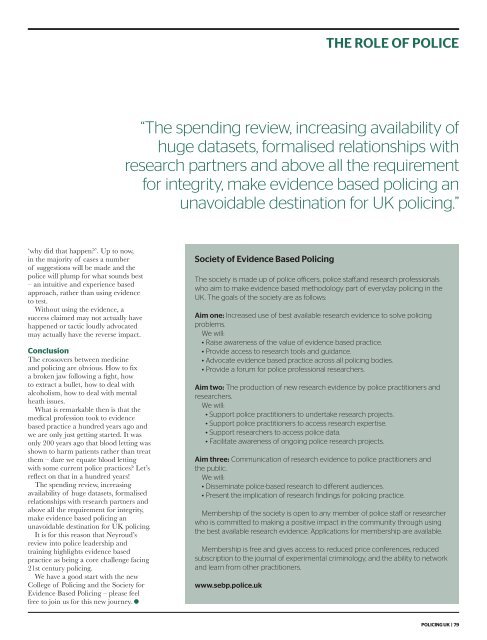Policing UK 2013 - Police Federation
Policing UK 2013 - Police Federation
Policing UK 2013 - Police Federation
You also want an ePaper? Increase the reach of your titles
YUMPU automatically turns print PDFs into web optimized ePapers that Google loves.
THE ROLE OF POLICE<br />
“The spending review, increasing availability of<br />
huge datasets, formalised relationships with<br />
research partners and above all the requirement<br />
for integrity, make evidence based policing an<br />
unavoidable destination for <strong>UK</strong> policing.”<br />
‘why did that happen?’. Up to now,<br />
in the majority of cases a number<br />
of suggestions will be made and the<br />
police will plump for what sounds best<br />
– an intuitive and experience based<br />
approach, rather than using evidence<br />
to test.<br />
Without using the evidence, a<br />
success claimed may not actually have<br />
happened or tactic loudly advocated<br />
may actually have the reverse impact.<br />
Conclusion<br />
The crossovers between medicine<br />
and policing are obvious. How to fix<br />
a broken jaw following a fight, how<br />
to extract a bullet, how to deal with<br />
alcoholism, how to deal with mental<br />
heath issues.<br />
What is remarkable then is that the<br />
medical profession took to evidence<br />
based practice a hundred years ago and<br />
we are only just getting started. It was<br />
only 200 years ago that blood letting was<br />
shown to harm patients rather than treat<br />
them – dare we equate blood letting<br />
with some current police practices? Let’s<br />
reflect on that in a hundred years<br />
The spending review, increasing<br />
availability of huge datasets, formalised<br />
relationships with research partners and<br />
above all the requirement for integrity,<br />
make evidence based policing an<br />
unavoidable destination for <strong>UK</strong> policing.<br />
It is for this reason that Neyroud’s<br />
review into police leadership and<br />
training highlights evidence based<br />
practice as being a core challenge facing<br />
21st century policing.<br />
We have a good start with the new<br />
College of <strong>Policing</strong> and the Society for<br />
Evidence Based <strong>Policing</strong> – please feel<br />
free to join us for this new journey.<br />
Society of Evidence Based <strong>Policing</strong><br />
The society is made up of police officers, police staff,and research professionals<br />
who aim to make evidence based methodology part of everyday policing in the<br />
<strong>UK</strong>. The goals of the society are as follows:<br />
Aim one: Increased use of best available research evidence to solve policing<br />
problems.<br />
We will:<br />
• Raise awareness of the value of evidence based practice.<br />
• Provide access to research tools and guidance.<br />
• Advocate evidence based practice across all policing bodies.<br />
• Provide a forum for police professional researchers.<br />
Aim two: The production of new research evidence by police practitioners and<br />
researchers.<br />
We will:<br />
▪• Support police practitioners to undertake research projects.<br />
▪• Support police practitioners to access research expertise.<br />
▪• Support researchers to access police data.<br />
▪• Facilitate awareness of ongoing police research projects.<br />
Aim three: Communication of research evidence to police practitioners and<br />
the public.<br />
We will:<br />
• Disseminate police-based research to different audiences.<br />
• Present the implication of research findings for policing practice.<br />
Membership of the society is open to any member of police staff or researcher<br />
who is committed to making a positive impact in the community through using<br />
the best available research evidence. Applications for membership are available.<br />
Membership is free and gives access to: reduced price conferences, reduced<br />
subscription to the journal of experimental criminology, and the ability to network<br />
and learn from other practitioners.<br />
www.sebp.police.uk<br />
POLICING <strong>UK</strong> | 79
















